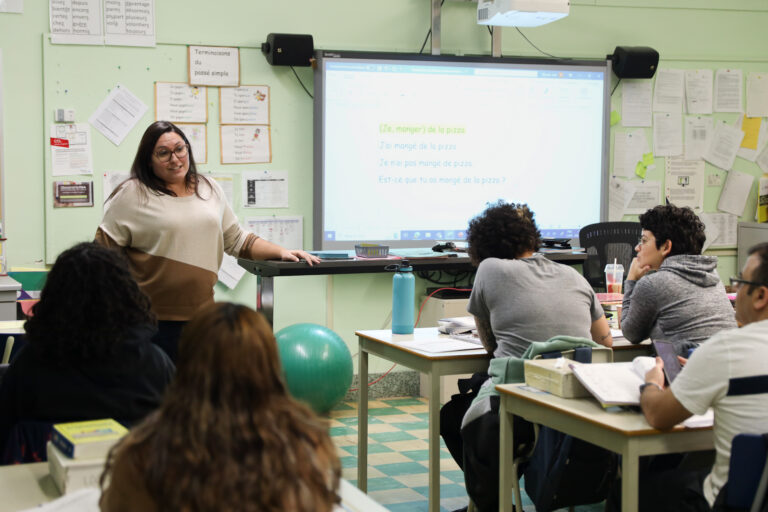There are many reasons for temporary foreign workers to learn French: to meet Quebec’s new requirements for renewing their work permits, to communicate with colleagues and employers, to socialize and to obtain permanent residency, for example. InfoTET and the team from L’ANCRE visited a francization class to find out more about the students’ background and the services available to them.
Text and photos: Marie-Anne Dayé
At the Centre d’éducation des adultes La Relance, in Saint-Jean-sur-Richelieu, demand for French courses is growing by leaps and bounds, up 150% in two years, points out liaison officer Joannie Giroux. “In the evenings, we used to have two groups; now we have six. During the day, we used to have three classes, now we have seven,” she adds. Students include asylum seekers, visitors, temporary foreign workers, permanent residents and non-French-speaking citizens.

French language skills
While temporary foreign workers were previously under no obligation to learn French, they will now have no choice but to do so. A new measure introduced by the Quebec government requires temporary foreign workers, with the exception of agricultural workers, to prove that they have at least a level 4 oral proficiency in French when renewing their work permits, after having been in Quebec for more than three years. Employers, meanwhile, will have to meet requirements to support their employees’ learning of French, but the details are not yet known.
As for permanent residency, level 7 (out of a total of 8) must be completed in order to apply. To obtain level 7, it takes a good two years, two and a half years of full-time study,” explains Joannie Giroux. In one year, we estimate that you’ll be able to achieve level 4, but after that, as the levels increase, so does the number of hours you have to devote to each level.
You can register for French courses on the Francisation Québec website, an initiative of the Quebec government’s Ministère de l’Immigration, de l’Intégration et de la Francisation, and choose between full-time, part-time or distance learning. At Centre La Relance, all three options are available, with a preference for face-to-face courses. “We’re aware that someone who works all day will find it harder to be consistent or on time. Still, we’re open and flexible. We have our distance learning courses for Level 3 students and above, who don’t need to travel,” explains Joannie Giroux. In her opinion, distance learning for level 1, 2 and 3 students does not position them for success. Some companies have opted to offer francization courses in the workplace, a way of limiting the obstacles associated with transportation and schedules. For example, since March 2023, La Relance teachers have been able to travel to workplaces to offer courses.
Settling in Quebec, a goal for many TFWs
For many temporary foreign workers, the aim of learning French, in addition to facilitating day-to-day communications, is to be able to settle permanently in Quebec. InfoTET met three TFWs during their francization course at La Relance, to find out what motivates them.
Nicolas Cedillo, Guatemala
Nicolas Cedillo is an artisan who makes bags and clothing from colorful traditional Guatemalan fabrics. He had his own boutique in Antigua and even opened a second one in Costa Rica before the pandemic disrupted his plans. Since September 2022, he has been working as a janitor at Complexe 360 in Saint-Jean-sur-Richelieu and learning French at La Relance. When asked “How is your French learning going?” he replies “Not worse, but it’s complicated to speak it”. Clearly, he has already integrated Quebec expressions into his vocabulary! Despite the difficulties, he is pursuing his goal of moving up the levels to obtain permanent residency. “When you learn another language, it opens a lot of doors, including for work.

David Cortes, Colombia
David Cortes arrived in Quebec in April 2023. Trained as a carossier in his homeland, he now works in Iberville for the Procolor company. “For me, it was a bit difficult with French,” he says. He is currently at level 3 and hopes to reach level 7 within a year. “But working and studying at the same time, I don’t have much time,” he notes. “It’s very important to learn the language. I love French. Permanent residency is a project for me.”
Andres Baquiro, Colombia
Andres Baquiro arrived from Colombia in August 2022 to work as an industrial mechanic at Frondémy in Chambly. He’s been studying French for a year and is currently at level 4: “I understand what I’m told and what’s written, but speaking is more difficult. I want to learn French to speak with my colleagues at work, to integrate better with the people here and also to obtain permanent residency. I’d like to settle here,” he says. His wife arrived at the beginning of the year with an open permit and has started the process of taking courses herself.
The paths of immigration and francization are rich and varied. In fact, the Quebec media team Rad recently aired its documentary 6 mois pour apprendre le français 6 mois pour apprendre le français, which takes viewers inside a francization class to witness the difficulties and successes experienced by students.
–
The project was funded by the Government of Canada.






